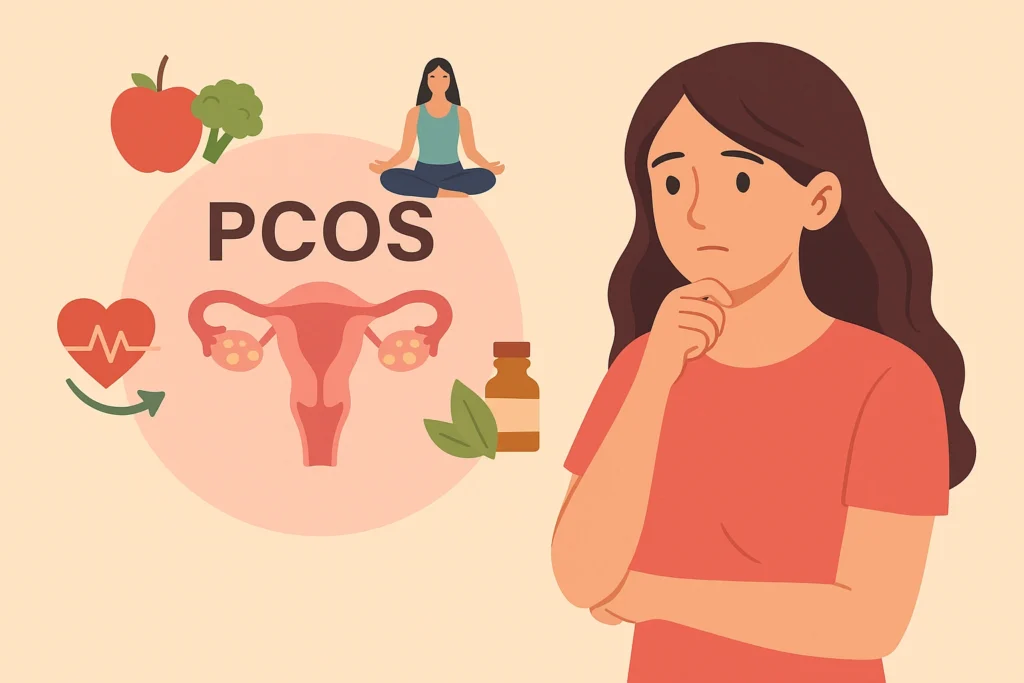Discover how to manage PCOS naturally through nutrition, exercise, stress management, and holistic therapies that address the root causes of hormonal imbalance. Explore sustainable lifestyle changes and alternative approaches that empower women to take charge of their health without relying on medication.
Introduction
Polycystic Ovary Syndrome (PCOS) has become one of the most common health challenges for women today, affecting everything from menstrual cycles to metabolism and emotional well-being. While medications are often prescribed to regulate hormones or manage symptoms, many women are now exploring holistic and sustainable approaches. The good news is that it is possible to manage PCOS naturally by making lifestyle shifts, adopting mindful practices, and turning to time-tested alternative remedies.
Understanding PCOS Beyond Medicine
PCOS is a complex condition linked to hormonal imbalance, insulin resistance, and inflammation. These underlying factors can influence menstrual irregularities, weight gain, acne, and even fertility challenges. Medications may provide temporary relief, but they rarely address the root causes. By focusing on diet, movement, stress regulation, and natural therapies, women can take control of their health in a way that supports long-term balance rather than quick fixes.
Nutrition: The Foundation of Natural PCOS Management
Food plays a pivotal role in managing PCOS symptoms. A diet that stabilizes blood sugar, reduces inflammation, and supports hormone balance can create remarkable improvements over time.
- Focus on low-glycemic foods: Whole grains, legumes, vegetables, and high-fiber fruits help regulate insulin levels and prevent spikes that worsen PCOS.
- Prioritize lean proteins and healthy fats: Foods like salmon, nuts, seeds, and avocados can reduce inflammation and promote satiety.
- Cut down on refined sugar and processed foods: These trigger insulin resistance and aggravate hormonal fluctuations.
- Consider anti-inflammatory choices: Turmeric, ginger, green leafy vegetables, and berries naturally soothe inflammation.
Some women also benefit from consulting a nutritionist for tailored diet plans. What matters most is consistency in making choices that fuel the body rather than deplete it.
The Role of Exercise in Balancing Hormones
Movement is medicine, especially when it comes to PCOS. Regular exercise improves insulin sensitivity, supports weight management in PCOS, and enhances mood through endorphin release. However, the type of exercise matters.
- Strength training: Helps build muscle mass and increases metabolic rate, both crucial for PCOS.
- Cardio in moderation: Walking, cycling, or swimming boosts cardiovascular health without overstressing the body.
- Mind-body practices: Yoga and Pilates not only strengthen the body but also reduce cortisol, the stress hormone that worsens PCOS.
The key is sustainability. Instead of extreme workouts that may lead to burnout, women with PCOS benefit most from a consistent, balanced routine.
Stress Management: A Crucial but Overlooked Factor
Chronic stress has a direct impact on PCOS by raising cortisol levels, which in turn disrupts reproductive hormones and worsens symptoms like irregular cycles or weight gain. Finding healthy ways to cope with stress can make a tangible difference.
- Mindfulness meditation calms the nervous system and lowers stress hormones.
- Deep breathing exercises improve oxygen flow and balance heart rate.
- Journaling or creative outlets help release emotional tension.
- Adequate sleep is non-negotiable, as poor rest disrupts both hormonal and metabolic function.
Creating rituals that allow for daily relaxation can shift the body into a state of healing and hormonal balance.
Natural and Alternative Approaches
Many women are turning to alternative therapies to complement lifestyle changes. These approaches work with the body’s natural rhythms rather than against them.
- Herbal remedies: Cinnamon may help improve insulin sensitivity, while spearmint tea has been linked to reducing excess androgens.
- Supplements: Inositol, vitamin D, and omega-3 fatty acids have shown promise in easing PCOS symptoms.
- Acupuncture: Increasingly used to regulate cycles, reduce stress, and improve fertility outcomes.
For those interested in holistic traditions, exploring Ayurveda for PCOS offers an ancient yet relevant approach. Rooted in balancing the body’s energies, Ayurvedic therapies often include personalized diets, herbal remedies, and detoxification practices that aim to restore harmony.
Practical Tips to Manage PCOS Naturally Every Day
Managing PCOS naturally goes beyond diet and exercise—it’s about creating consistent daily habits that support hormonal balance. Start by tracking your health: monitor menstrual cycles, weight, and energy levels to understand patterns and improvements. Hydration is key, as drinking enough water and incorporating herbal teas or warm lemon water can aid metabolism and detoxification. Supporting gut health is equally important; fermented foods like yogurt, kefir, and naturally fermented vegetables can improve digestion and insulin sensitivity.
Minimizing exposure to endocrine-disrupting chemicals in plastics, personal care products, and pesticides can help maintain hormone balance, so choosing organic or natural alternatives is advisable. Stress management remains crucial—daily mindfulness, meditation, or gentle yoga can lower cortisol and support overall well-being. Finally, seek community or peer support, whether online or in person, to share experiences, gain insights, and stay motivated. By embracing these small, consistent habits, women can gradually achieve long-term improvements and take control of their PCOS naturally.
Building Sustainable Habits
One of the challenges with PCOS is that results take time. Natural management is not about a “quick fix” but about creating lasting changes that gradually improve hormonal balance and overall health. Small, consistent efforts—like replacing sugary drinks with herbal teas, scheduling daily walks, or practicing yoga for 20 minutes—can compound into long-term benefits.
It’s also important to stay patient. Tracking progress through cycle journals, food logs, or regular health check-ins can help women notice improvements that may not be immediately obvious.
Emotional Well-being and Support
PCOS is not just a physical condition; it often affects self-esteem and mental health. Struggles with weight, skin issues, or fertility can lead to frustration or anxiety. Seeking support—whether through therapy, support groups, or open conversations with loved ones—creates a safe space to share challenges and celebrate progress.
Self-compassion also plays a key role. Instead of focusing solely on the limitations imposed by PCOS, reframing the condition as a call to nurture the body more intentionally can foster resilience and positivity.
Conclusion: How to Manage PCOS Naturally for Long-Term Health
Managing PCOS without medicine is not only possible but also empowering. By embracing nutrition, movement, stress reduction, and alternative therapies, women can address the root causes of PCOS and move toward a healthier, more balanced life. While the journey requires patience and consistency, the outcome is worth the effort—a body and mind that feel supported, resilient, and in harmony.
For women seeking guidance on holistic care, Well Women Clinic being gynaecologist specialist in London provides comprehensive support tailored to every stage of a woman’s health journey. With a strong focus on preventive care and alternative approaches, the clinic combines medical expertise with a compassionate, patient-first philosophy. Women navigating PCOS can benefit from personalized consultations, evidence-based advice, and integrative strategies designed to promote long-term balance and well-being. By addressing both physical and emotional aspects, Well Women Clinic empowers women to take charge of their health with confidence and clarity.





